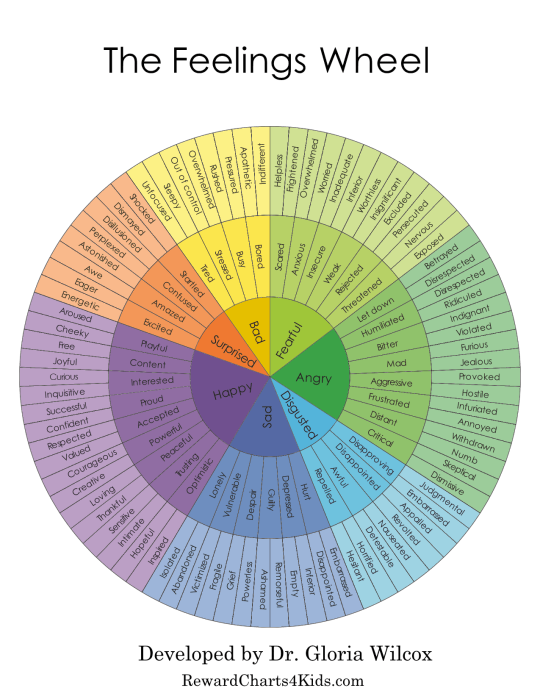#emotion wheel
Text
[ ty for giving the picture, @thundersyst3m , but like i said in dms im going to text format it cause sight issues ]
for people(including us) that have trouble identifying emotions, i think this would be very helpful :). also might help writers :D
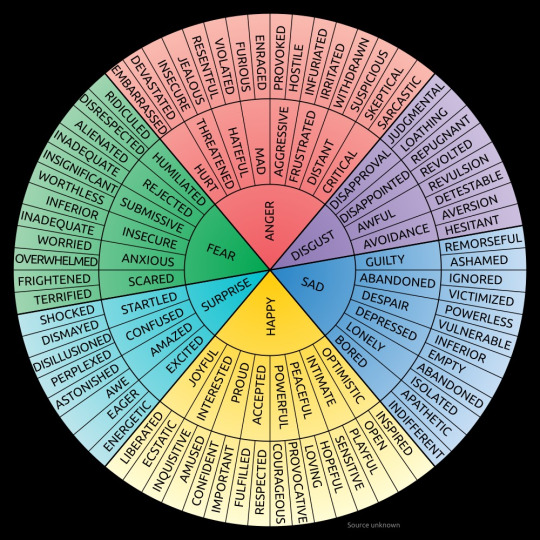
happy;
joyful; feeling, expressing, or causing great pleasure and happiness.
interested; showing curiosity or concern about something or someone; having a feeling of interest.
proud; feeling deep pleasure or satisfaction as a result of one's own achievements, qualities, or possessions or those of someone with whom one is closely associated.
accepted; generally believed or recognized to be valid or correct.
powerful; having control and influence over people and events.
peaceful; free from disturbance... tranquil.
intimate; closely acquainted.. familiar, close. | OR | private and personal.
optimistic; hopeful and confident about the future.
liberated;
(of a person) showing freedom from social conventions or traditional ideas, especially with regard to sexual roles.
ecstatic; feeling or expressing overwhelming happiness or joyful excitement.
inquisitive; curious or inquiring.
amused; finding something funny or entertaining.
confident; feeling or showing confidence in oneself.. self-assured.
important; of great significance or value; likely to have a profound effect on success, survival, or well-being.
fulfilled; satisfied or happy because of fully developing one's abilities or character.
respect(ed); admire (someone or something) deeply, as a result of their abilities, qualities, or achievements.
courageous; not deterred by danger or pain.. brave.
provocative; causing annoyance, anger, or another strong reaction, especially deliberately.
loving; feeling or showing love or great care... showing or feeling affection
sensitive; quick to detect or respond to slight changes, signals, or influences.
playful; fond of games and amusement... lighthearted.
open; allowing access, passage, or a view through an empty space.. not closed or blocked up. regarding emotions,, being open to ideas/feelings/thoughts.
inspired; of extraordinary quality, as if arising from some external creative impulse.
sad;
bored; feeling weary because one is unoccupied or lacks interest in one's current activity.
lonely; sad because one has no friends or company... solitary.
depressed; (of a person) in a state of general unhappiness or despondency.
despair; the complete loss or absence of hope... giving up.
abandoned; having been deserted or cast off.
guilty; culpable of or responsible for a specified wrongdoing... a feeling of having done wrong or failed in an obligation.
indifferent; marked by a lack of interest, enthusiasm, or concern for something.
apathetic; showing or feeling no interest, enthusiasm, or concern.
isolated; far away from other places, buildings, or people; remote. | OR | having minimal contact or little in common with others.
empty; containing nothing.. not filled or occupied. | OR | (of words or a gesture) lacking meaning or sincerity.
inferior; lower in rank, status, or quality.
vulnerable; susceptible to physical or emotional attack or harm.
powerless; without ability, influence, or power.
victimized; single (someone) out for cruel or unjust treatment.
ignored; refuse to take notice of or acknowledge... disregard intentionally.
ashamed; embarrassed or guilty because of one's actions, characteristics, or associations.
remorseful; filled with remorse.. sorry.
anger;
hurt; cause physical pain or injury to. | OR | an 'attack' to ones feelings/state/interests.
threatened; state one's intention to take hostile action against someone in retribution for something done or not done. | OR | someone's intention to take hostile action against you in retribution for something done or not done.
mad; very angry.
aggressive; ready or likely to attack or confront... characterized by or resulting from aggression.
frustrated; feeling or expressing distress and annoyance, especially because of inability to change or achieve something.
distant; far away in space or time. | OR | (of a person) not intimate; cool or reserved.
critical; expressing adverse or disapproving comments or judgments.
embarrassed; feeling or showing embarrassment. <- a feeling of self-consciousness, shame, or awkwardness.
devasted; destroy or ruin (something). | OR | cause (someone or feel) severe and overwhelming shock or grief.
insecure; (of a person) not confident or assured; uncertain and anxious. | OR | not firmly fixed... liable to give way or break.
jealous; feeling or showing envy of someone or their achievements and advantages. | OR | feeling or showing suspicion of someone's unfaithfulness in a relationship. | OR | fiercely protective or vigilant of one's rights or possessions.
violate(d); break or fail to comply with (a rule or formal agreement). | OR | fail to respect (someone's peace, privacy, or rights). | OR | treat (something sacred) with irreverence or disrespect.
furious; full of anger or energy... violent or intense.
enraged; very angry... furious.
provoked; stimulate or give rise to (a reaction or emotion, typically a strong or unwelcome one) in someone. | OR | stimulate or incite (someone) to do or feel something, especially by arousing anger in them.
hostile; unfriendly... antagonistic.
infuriate(d); make (someone or feel) extremely angry and impatient.
irritated; showing or feeling slight anger.. annoyed.
withdraw; not wanting to communicate with other people.
suspicious; having or showing a cautious distrust of someone or something.
skeptical; not easily convinced... having doubts or reservations.
disgust;
disapproval; possession or expression of an unfavorable opinion.
disappointed; (of a person) sad or displeased because someone or something has failed to fulfill one's hopes or expectations.
awful; used to emphasize the extent of something, especially something unpleasant or negative. | OR | very bad or unpleasant.
avoidance; the action of keeping away from or not doing something.
judgemental; of or concerning the use of judgment. | OR | having or displaying an excessively critical point of view.
loathing; a feeling of intense dislike or disgust... hatred.
repugnant; extremely distasteful... unacceptable. | OR | in conflict with... incompatible with.
revolted; rebellion.
revulsion; an intense, violent, sometimes physical dislike of something.
detestable; deserving intense dislike.
aversion; a strong dislike or disinclination.
hesitant; tentative, unsure, or slow in acting or speaking.
fear;
scared; fearful.. frightened.
anxious; experiencing worry, unease, or nervousness, typically about an imminent event or something with an uncertain outcome. | OR | wanting something very much, typically with a feeling of unease.
insecure; (of a person) not confident or assured; uncertain and anxious. | OR | not firmly fixed... liable to give way or break.
submissive; ready to conform to the authority or will of others... meekly obedient or passive.
rejected; dismiss as inadequate, inappropriate, or not to one's taste. | OR | refused to agree to (a request). | OR | fail to show due affection or concern for (someone)... rebuff.
humiliated; (make someone) feel ashamed and foolish by injuring their dignity and self-respect, especially publicly.
terrified; cause to feel extreme fear.
frightened; afraid or anxious.
overwhelmed; bury or drown beneath a huge mass.
worried; anxious or troubled about actual or potential problems.
inadequate; lacking the quality or quantity required; insufficient for a purpose. | OR | (of a person) unable to deal with a situation or with life.
inferior; lower in rank, status, or quality.
worthless; having no real value or use.
insignificant; too small or unimportant to be worth consideration. | OR | (of a person) without power or influence. | OR | meaningless.
alienated; experiencing or inducing feelings of isolation or estrangement.
disrespected; feeling a lack of respect for.. insulted.
ridiculed; (someone or something) to contemptuous and dismissive language or behavior.
surprise;
startled; feeling or showing sudden shock or alarm.
confused; (of a person) unable to think clearly... bewildered.
amazed; greatly surprised... astonished.
excited; very enthusiastic and eager.
shocked; surprised and upset.
dismayed; cause (someone) to feel consternation and distress.
disillusioned; disappointed in someone or something that one discovers to be less good than one had believed.
perplexed; completely baffled... very puzzled.
astonished; greatly surprised or impressed... amazed.
awe; a feeling of reverential respect mixed with fear or wonder.
eager; (of a person) wanting to do or have something very much. | OR | (of a person's expression or tone of voice) characterized by keen expectancy or interest.
energetic; showing or involving great activity or vitality.
#decays rambles#emotion wheel#emotions#writers#writers on tumblr#actually mentally ill#mentally ill#emotion help#neurodivergent
50 notes
·
View notes
Text
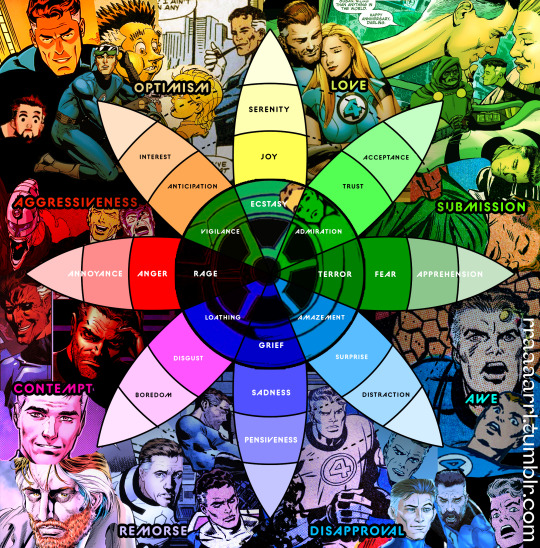
Mister Fantastic's Fantastic Feelings Wheel
For those times when you just can't articulate what your feelings are! Yippee!
Don't forget the Doctor Doom companion piece to go with it!
#reed richards#fantastic four#mister fantastic#my edits#emotion wheel#feelings wheel#mental health#farts and crafts#infographics
37 notes
·
View notes
Text
Dude! Look what I found!!
@ace-sher-bi-john
This could definitely be used for ace and allo folks. Because just trusting and opening up to someone can cause all kinds of feels for both parties. And it gives physical descriptions on how feelings feel in the body which is hella useful for someone like me (AUDHD).
What do you think? Maybe approaching the romance writing aspect via the feelings associated with trust, respect, openness, and loyalty. With multidimensional characters, they would respond uniquely to these things. DID I SOLVE THE PROBLEM??
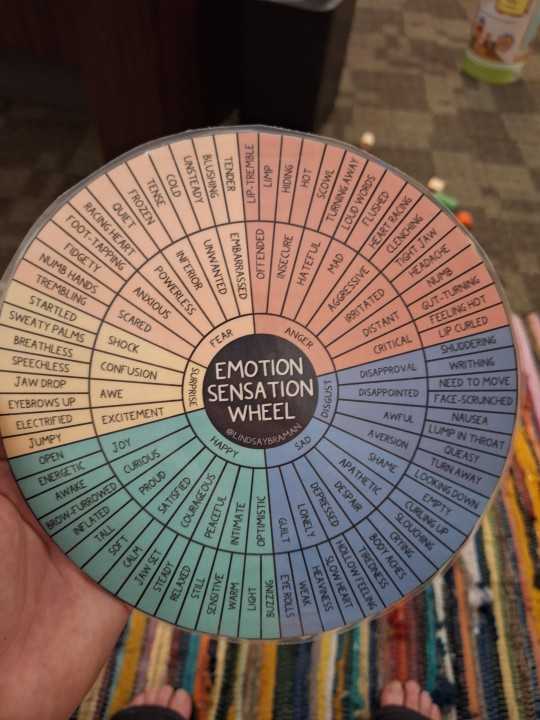
15 notes
·
View notes
Text
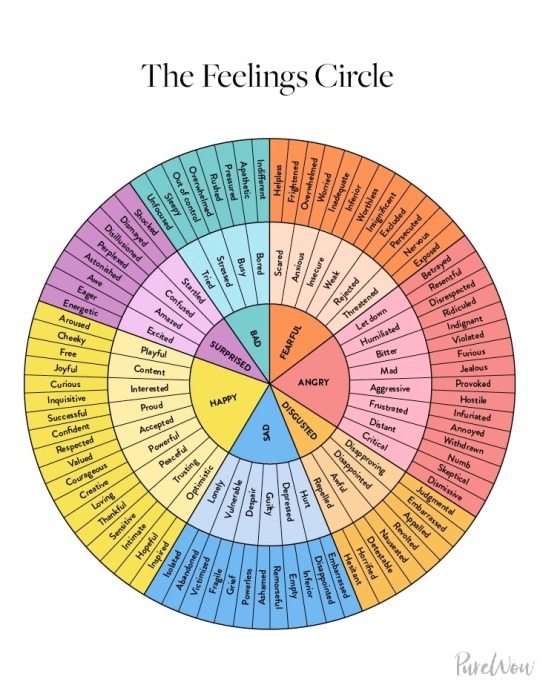
For the people who can’t find the right word to describe how their feeling.
This has been a good tool for me personally
#emotion wheel#therapy#mentalheathawareness#mental health tips#emotion logging#bipolor#mental strength#emotional control
12 notes
·
View notes
Text
New emotions for inside out 5!
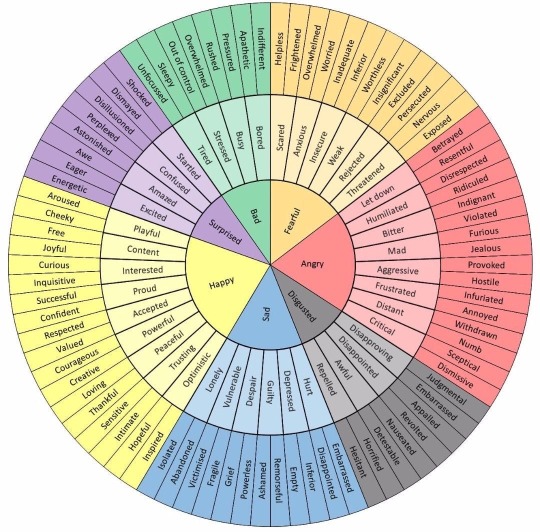
6 notes
·
View notes
Text
YALL

YALL
I love it so much yes yes yes
2 notes
·
View notes
Text
I often imagine my feelings as graphs. It helps me find connections and details to my feelings and thought process. I imagine feelings are different shapes, but with grief, I connect it to a circle. You have happiness, sadness, anger, anxiety and all the details in between these feelings. Your emotions are always temporary, which isn’t a bad thing, meaning when you are in dark times you will circle around again to the happy, light times again and vice versa.
Emotions come in cycles.
With grief, I imagine a smaller circle inside this big circle of general feelings. The difference with grief that no one warns you about, is that the big picture of grief is permanent. Grief is not something that will ever go away once it happens to you especially when it is over someone very close to you that you loved deeply.
However, the feelings within grief do have cycles. The 5 stages of grief. The happiness, the laughter, the sadness, the terrifying, the anger, and everything in between that is inside of grief. Those feelings are temporary, they go through cycles.
The permanency of grief doesn’t have to be bad, I’m learning from these past 4 weeks. I’ve always marked my major emotions such as my diagnosed anxiety disorder, as another person. I imagine the shape of another person when I handle my anxiety. I have learned to befriend my anxiety and learned that sometimes the big emotions work in my favor. Sometimes.
Grief has become a third of me. Another me. Another physical being of me. Grief I will befriend someday. As I slowly learn Grief, I know they will teach me to slow down, take care of myself and that sometimes you cannot just push past and rush or you’ll crash in Grief’s cycle of dark sadness. Grief doesn’t have to be bad or horrible. But Grief is permanent and learning to live with Grief is the only way. Don’t resent the cycles, remember that cycles themselves are temporary.
People will try and tell you it gets better in time. It’s more that it will become manageable in time. You will have your happy moments, your joyful funny moments but you will always cry again. You’re human. Allow yourself to ride the waves instead of drown.


#grief#mental health#teri underhill#neurodivergent#reflection#loss#cycles#emotion wheel#feelings#emotions#feeling wheel#graphs#art
4 notes
·
View notes
Text
RPG Talk: The Challenge of Emotional Communication for Adults
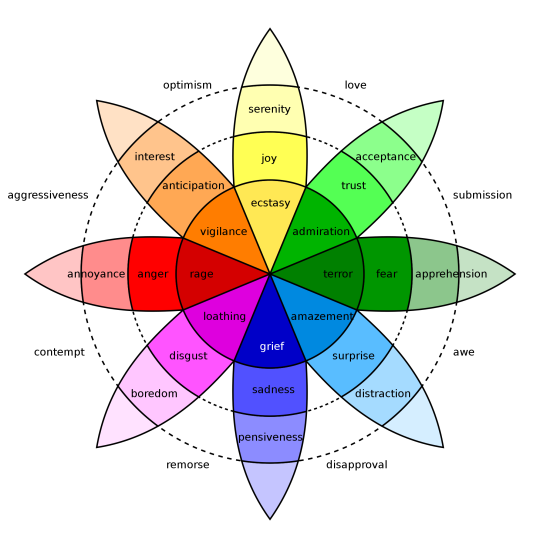
"Honesty is the best policy", or so the old chestnut goes. But when it comes to getting adults to discuss and dissect their emotions, goals, dreams- is that really the case? The TTRPG can be silly, frivolous, crunchy, yes, but most often, it does involve some degree of role-playing, of getting in touch with emotions personal and interpersonal.
The reason I bring this up today? The central character of our adventure, Jemu, is heavily based on Fred Rogers. He's most famous, of course, for Mr. Rogers Neighborhood, but he did produce a show intended for adults in the late 70s: Old Friends, New Friends. Very little of this show is accessible today.
youtube
There is one episode on Youtube (embedded here) focusing on musician Lorin Hollander and his work with prisoners. It is fascinating to watch. You see barriers erode under the simple usage of music, talking, listening. Some resist more than others. But there are ways to reach people, even very hurt and violent people.
A lot of contemporary criticism calls Old Friends, New Friends something of a failure, and Fred grew frustrated with it quickly. A lot of critics say that his approach doesn't seem as effective with adults as with children. I don't see as much of that in this example. Direct emotional interrogation does make many people wilt, but in the right context, with the right support, it can be healing like no other form of conversation.
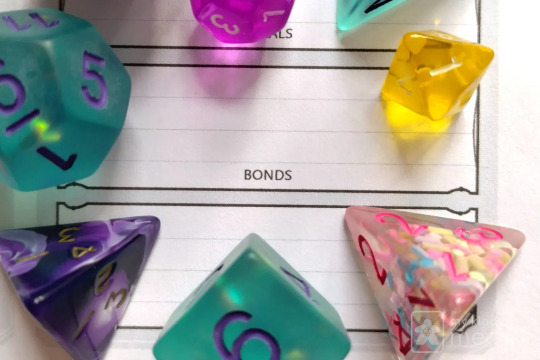
Funnily enough, playing an RPG can break down some of the defenses that adults build up. I've seen people who are very guarded in real life become much more emotional beings in the world of D&D. I wonder what Fred would have been able to do in the world of RPGs if they had clicked with him.
#dnd#d&d#fred rogers#mr rogers#old friends new friends#ttrpg#writing inspiration#writing an rpg#green hollow#emotional intelligence#communication#emotion wheel#incarceration#Youtube
18 notes
·
View notes
Text
Transcript Episode 75: Love and fury at the linguistics of emotions
This is a transcript for Lingthusiasm episode ‘Love and fury at the linguistics of emotions’. It’s been lightly edited for readability. Listen to the episode here or wherever you get your podcasts. Links to studies mentioned and further reading can be found on the episode show notes page.
[Music]
Lauren: Welcome to Lingthusiasm, a podcast that’s enthusiastic about linguistics! I’m Lauren Gawne.
Gretchen: I’m Gretchen McCulloch. Today, we’re getting enthusiastic about the linguistics of emotions. But first, thank you to everyone who recommended us for our anniversary episode!
Lauren: We’ve enjoyed sharing six years of Lingthusiasm with you. It’s always nice to see you share it with other people who need a little more linguistics in their lives.
Gretchen: Our most recent bonus episode was about using pseudo olde-y time-y English for fun and vibes.
Lauren: Hither thee to patreon.com/lingthusiasm to listen to all our bonus episodes and help keep the show ad-free
[Music]
Gretchen: Lauren, I have a sort of philosophical question. Do you think emotions are things like numbers, like things that sort of exist at some level out in the world, or things that are more like food where what constitutes food is really culturally specific?
Lauren: I’m gonna answer your philosophical question with some linguistic data.
Gretchen: Amazing.
Lauren: There is a really great paper that has looked at how different cultures carve up the emotion space in terms of the words they use for different emotions.
Gretchen: That sounds like a really interesting way of answering that question.
Lauren: This was a project from Joshua Conrad Jackson and a whole team who looked at how different languages group together different emotions into a single word – a process that they call “colexification.”
Gretchen: If we take a non-emotional, more concrete example of this to start, for example, a word like “pueblo” in Spanish could be translated into English with either “people” or “village.” This suggests that these two concepts may be more closely linked in Spanish where “pueblo” can mean both of these things versus in English where you have two words and treat them as more distinct concepts.
Lauren: Or Japanese has “shima” for “community” or “island.” Again, two things that we have as separate words in English put together in the same word in another language.
Gretchen: The inverse can also be the case. There’re things that English puts together as one word that another language might split.
Lauren: Oh my gosh, in terms of emotions, the one that I think feeds a lot of the English romance novel tradition is the fact that the word “love” can mean so many different types of love, which causes all kinds of confusion in romance novels, maybe daily life.
Gretchen: You have romantic love, familial love, things like – so in Spanish, you have “querer,” which is more like love you have for your friends or family, and “amar,” which is more like I’m “in love” with someone. English doesn’t really distinguish between these.
Lauren: Indeed.
Gretchen: I think Ancient Greek distinguishes between “agape” and “philia” and various other types of love. Again, English isn’t distinguishing between these at a lexical level, which isn’t to say that English speakers aren’t aware at some level that there’re multiple kinds of love, just like speakers of other languages can be aware that there are different kinds of other emotions even when there’s one word for them.
Lauren: It’s just what emotions tend to be closely associated with each other because they share a word as a label. In Persian – to move beyond “love” – Persian has a single word that encompasses the concepts of both grief and regret, whereas if you turn to a language like Dargwa, grief is more closely linked with what we would translate as the concept of anxiety. You can see how grief might relate to both regret or anxiety, but these languages have grouped those together in different ways.
Gretchen: That’s a really interesting thing about this study that they’re drawing these maps at the level of a language family showing that certain language families have certain tendencies in terms of which concepts they’re associating with each other. They’ve got a map of Austronesian languages, which are spoken in the South Pacific and Southeast Asia, and they’ve got fear and surprise as linked together on their emotional map.
Lauren: Whereas for the languages of the Nakh-Daghestani group, which is in the area of the Caucasus which runs down from Russia through to Turkey, they have fear linked with anxiety and grief.
Gretchen: Right. Which is a different level of, maybe, positivity when it comes to what you’re associating fear with, whether it’s grief and anxiety or whether it’s surprise. Maybe you have a bit of a different cultural association around fear.
Lauren: One of the things I really appreciate about these maps is that you tend to find that languages will have very similar maps of emotions in this way to other languages that they are related to historically but also other languages that are just in the geographic area, and it makes me feel really positive about the possibility of understanding your neighbour because there’re these tendencies that happen within particular regions.
Gretchen: Aw, that’s really charming. Even if you don’t necessarily speak languages that come from a common ancestor that people seem to converge on emotion words when they’re in contact with people who speak something that’s in their area.
Lauren: But the authors are very clear to point out that even though we see these tendencies, there’s still so much variation between even related languages in how we carve up the emotion space and that each language does things from its own particular perspective.
Gretchen: And like we saw with “love” in English, just because a language uses the same word for two concepts that are distinguishable doesn’t necessarily mean that speakers aren’t distinguishing between them in other ways.
Lauren: Indeed.
Gretchen: Ideally, it seems like it would be really cool if we could do this from a historical perspective as well because if we’re finding languages that are historically related or geographically related have similar emotion words, then it seems like looking through history would be a fun way of looking at that.
Lauren: You would be correct in thinking that is a fun thing to do. But one of the biggest challenges that we have is that, historically, people weren’t really focused on using labels to talk about emotions or to interrogate emotions in written records, which is unfortunately all we have left until we figure out time travel.
Gretchen: Definitely something I’d do with a time machine. You get historic texts with something like a character weeping or wailing or tearing their hair or wailing and gnashing of teeth, but you’re less likely to get something like “felt surprise” or “felt angry” or this sort of detailed psycho-analytic parsing of emotion.
Lauren: Yeah, if we look at historical records, a lot of written records were just, “These people did these things at this time,” and then if it is something about a myth or a story of people, it is very much about the performance of actions. Those actions might be associated with emotions but not a lot of talking about the emotions or the internal states themselves.
Gretchen: It’s interesting to think of how that changes as literary traditions change. You have going from “This character was wailing and crying and tearing their hair out,” to maybe a Shakespearean character giving a soliloquy, to characters in novels or things that have stream-of-consciousness style where it’s actually trying to replicate what’s going on in terms of someone’s emotional state. That’s a fairly recent development in the history of literature.
Lauren: Unfortunately, it means those historical perspectives are still very open questions.
Gretchen: Again, something to put in the linguistics time machine box.
Lauren: It does make you realise just how culturally mediated our experience of emotions are and how we might label them and we might talk about them. That’s something that kids have to learn as they are growing up in the languages and the environments that they are being raised in.
Gretchen: There’s this really fun paper about how kids learn emotion words and develop their emotional expressions, and I think the thing that’s the most fun about this is that it puts into academic words what is probably familiar territory for a lot of people if you’ve met a few kids. Here’s a few quotes from this paper. It says, “By the time language begins, towards the end of the first year, emotional expression is already well-established. Children do not need to learn the names of the emotions in order to tell other people what they are feeling.”
Lauren: So, as a translation, just because kids don’t know the word for “sad” doesn’t mean that they can’t be very, very sad at you by screaming in your face.
Gretchen: [Laughs] Yeah, I think that’s basically what it’s saying.
Lauren: Hm, yeah, that makes sense to me.
Gretchen: “But they do need to learn the language to tell other people what their feelings are about. Language does not replace emotional expression, rather children learn language for expressing and articulating the objects and circumstances of their emotional experiences while they continue to express emotion with displays of positive and negative affective tone.”
Lauren: Kids can laugh and cry.
Gretchen: And throw screaming tantrums on the floor, yeah.
Lauren: And throw absolute meltdowns. But they have to learn to talk about these things as well, which is why so many children’s books spend so much time talking about the emotions and the feelings of the characters because it’s a really great space to practice doing that in.
Gretchen: There’s so many interesting spaces for figuring out what particular emotions are. I think one of the tools that’s also used for adults is an emotion wheel. You have this round circle that has – on all of the different spokes around the wheel in often various fun colours – different names of emotions. They try to categorise them by major emotions, or major emotional categories, and to minor and more refined bits of different emotions.
Lauren: Oh, I’ve definitely seen one of these emotion wheels for sure.
Gretchen: I think therapists use them sometimes or teachers or educators to try to help scaffold people into talking about emotions. But the thing that fascinates me as a linguist is that there are many emotion wheels, and they’re not all the same.
Lauren: Because you would expect that there are some really prototypical emotion categories that we can break down into more complex or nuanced emotions.
Gretchen: Right. But which categories different emotion wheels think of as “prime” categories or “primitive” categories that everything else is a refinement of seems to vary depending on the emotion wheel. I saw one that has “happy” and “sad” and “angry” as your basic emotions, and then another one that has things like “peaceful” and “powerful” and “joyful” as your basic emotions.
Lauren: Oh, wow. They’re very different. I feel like those people are trying to aspire to some kind of abstract synthesis of different emotion types.
Gretchen: Right. It’s kind of like are you starting with the kid emotions that maybe you learn really early or are you starting with an abstract synthesis. A lot of them end up in fairly similar places. Both of these wheels have “proud,” but one of them puts “proud” under “powerful,” and the other one “proud” under “happy.” I mean, you could also think of “proud” in some contexts as a negative emotion, so putting it under a particular overarching category is making a theoretical statement.
Lauren: The thing I find interesting about these emotion wheels is that they often try very hard to have half the wheel be positive emotions and half the wheel be negative emotions. I was thinking about this, and there is one study I’ve tracked down that’s looked at English and Spanish in terms of how many positive and negative emotion words there are. They find for both languages that there are negative skews in terms of the number of words that we have and the number of words we use to talk about negative emotions, which makes sense because if things are going fine, it’s fine, and if things aren’t going fine, you need a lot more words to explain that.
Gretchen: I think there’s a Tolstoy quote about how every happy family is the same and every unhappy family is different in various different ways.
Lauren: Or maybe it’s just that they have more words to explain their unhappiness.
Gretchen: But maybe you need words to talk about exactly the precise degrees to which you are unhappy. Also, like with the pride thing, I don’t know if all emotions can be strictly characterised between being positive or negative or being good or bad. Our negative emotions are still there to tell us something. An emotion like “Schadenfreude,” which is pleasure in someone else’s misfortune, is that a positive emotion or a negative emotion? Emotions can also be complex.
Lauren: I think that’s one of the important things to understand about emotions is that it’s not just kids that have to learn labels for emotions. Coming to understand them and coming to find words to express them is really a bit of a lifespan project. I think about how, as I’m getting older, I’m coming to understand really nuanced and complex emotions like one that I can only describe as “happy crying,” which is a thing that, as I get older, I find myself doing more. I’m like, I’m very confused because this is not an emotion I learnt in a kid’s book or I learnt early on or I have a go-to label for but is definitely part of my life as I find myself in more situations where I’m, like, happy but weirdly crying about it.
Gretchen: I feel like as a kid I would sometimes see adults doing happy crying and being like, “What’s going on here?” And now I’m like, “Oh, I know what this is.” The same thing for emotions like nostalgia. The depths of nostalgia that I can arrive at continue to grow as I have more things to be nostalgic about.
Lauren: Indeed. That one is gonna be a real lifespan project, isn’t it.
Gretchen: I think it’s also good to point out that there are different routes and paths and paces to the process of figuring out emotions and how to label them. I recently learned the word “alexithymia,” which is a condition where you have difficulty connecting with and labelling your emotions. I think it can be validating to know that there are words for even the very process of finding it difficult to put words to your emotions.
Lauren: “Alexithymia” is a new word for me, but I feel like it’s something that could help people make a lot of sense of the way they experience the world and process emotions.
Gretchen: There’s also some interesting research on bilingual people and their experience of emotion terms.
Lauren: I guess we talked earlier about how different languages carve up the emotion space, and so having access to emotion vocabularies in different languages that do different things might help with different perspectives on that.
Gretchen: Another thing that seems to really affect people is the order and context in which they learned different emotional words in different languages. It often seems to happen that when people learned a language young or with family, they have stronger emotional associations with that language’s emotion words, like I think with swear words where if you’ve been exposed to that swear word in its context a lot, you have a stronger emotional reaction to it. This can be either helpful in the context where, if you’re trying to be extra affectionate with someone, like say you’re having kids, and you wanna talk about particularly affectionate words, you wanna do that in a language that feels very intimate and affectionate for you, but then also sometimes it can be helpful for people to use that second or third language and have more emotional distance from a concept and make it easier to talk about without getting overwhelmed by emotions.
Lauren: There’re absolutely advantages in some contexts to feeling a little bit less of an emotional punch when you’re using these big emotion words or having big conversations about emotions and feelings. I can see how it’s both a useful thing sometimes and a bit of a, like, the distance is unhelpful sometimes.
Gretchen: There’s one quote from somebody who says, “I have a preference for French. When my children were born, I wanted to use English just so they would be accustomed to it from an early age, but I just couldn’t. It sounded untrue.” That’s the sort of affectionate side.
Lauren: Then the flip side is a Russian speaker who was reflecting on the fact that saying, “I love you,” in English is somewhat easier than when they were trying to say, “I love you,” in Russian. I’m just like, “Oof.” As someone for whom English is the most easy-to-access emotion language for me, the idea that English is an easy language to say that in does not work in my model of emotions at all. Which language you have more emotional access to, I guess, really depends on your upbringing.
Gretchen: I think that’s something that is difficult when it comes to trying to teach computers about how to understand emotions.
Lauren: Yes, given that they, as far as we can tell so far, have access to no actual emotions regardless of which language they start with.
Gretchen: You give them a whole bunch of data, give them a whole bunch of emotion words, but then if they’re trying to understand something that requires a bit more context like sarcasm or being hyper-negative for emphasis, they fall apart.
Lauren: This weird thing we do with language as humans is play with it, and part of playing with it sometimes is – we talked about some things are ambiguously positive or negative depending on context, but we can actually use highly negative language to be positive because we’re trying to get people’s attention. For example, I could say something like, “That puppy is disgustingly cute. I hate it.”
Gretchen: I know not just from the context of “puppy” and “cute” but also from the way you’re saying it, your tone of voice, your context, that you’re actually very positive about this puppy.
Lauren: “It’s so cute!”
Gretchen: “I can’t handle it!” This gets to another facet of talking about emotion which is how the emotions come out from our tone of voice not just from the words we label them from.
Lauren: It’s not just what we say, it’s how we say it.
Gretchen: There are some acoustic studies about the effect of smiling on various physical parts of the sound signal.
Lauren: Ah, okay, because I feel like there’s always this advice to smile to sound upbeat, and I just thought that was someone trying to be annoying. But you’re saying there are actually observable features that happen if we smile while we’re talking.
Gretchen: Well, why don’t we try something. If I say the same sentence twice – and I’ll try to say it as similar as possible – but one time I’m smiling, and the other time I’m not, and you can see if you can guess which one I’m smiling on.
Lauren: Excellent. Very handy this is a podcast, and we can’t see what you’re doing with your mouth.
Gretchen: Exactly. Number One: “This is an example sentence.” Number Two: “This is an example sentence.”
Lauren: Oh my gosh, you were smiling on the second one.
Gretchen: I was.
Lauren: There was almost nothing else that was different. It was exactly the same intonation.
Gretchen: I was really trying so hard.
Lauren: You were a very good experimental sentence-producer, but there was something different about that second sentence.
Gretchen: Yeah, and that is that smiling seems to increase the pitch a little bit – for all speakers – and then for some speakers, it also makes things a little bit louder or a little bit more extremes between the highest and lowest pitch, and that they seem to be heard as smiling because smiling does change the shape of you mouth, and it changes the sounds as it comes out of it.
Lauren: I guess when people say you should smile to sound like you’re more enthusiastic, I should actually take that advice. It’s pretty good advice. It checks out.
Gretchen: I guess so. Do you wanna hear what some other acoustic correlates of emotions are?
Lauren: Sure. Let’s start with “anger” to go for something very different.
Gretchen: Right. First of all, there are two kinds of anger. You have cold anger and hot anger.
Lauren: So, icy rage and spicy rage.
Gretchen: Oh, I think so. Cold anger, that’s a very stern anger, is produced with a lower pitch, higher intensity, and more energy, whereas hot anger, which is a blowing-your-top-off, losing-your-temper-type anger –
Lauren: That’s our spicy rage.
Gretchen: That’s our spicy rage – is produced with a higher, more varied pitch, rather than being a low grumble is a higher, more varied pitch, and even greater energy than cold anger.
Lauren: I never really thought about the fact that anger – again, thinking about what emotions we pack into a single word, I never thought about the fact we have two very different things that we label as “anger” but are expressed in our tone of voice very differently.
Gretchen: Even though we’re calling them both “anger,” we have this sense of what these two varieties are and how to produce them differently. Then, fear is produced with a higher pitch, less variation in terms of up and down pitch variation, and lower energy, and a faster speech rate, which makes sense to me because you sort of [higher pitch] “Uhhhhh fear.”
Lauren: Yeah. I like that it’s a higher pitch like our hot anger, but it has lower energy. There’re all these different parameters that we are manipulating when we show emotion in our voices.
Gretchen: Then sadness is also produced with a higher pitch, less intensity, but more energy and more pauses of longer duration. But this seems to be English specific because there’s also a Japanese study where speakers, especially female speakers, use a lower pitch for sadness. There may be also culturally specific aspects to some of these acoustic correlates of emotions.
Lauren: Just like we learn different words and different associations for those words across different cultures we also learn to express our emotions in different ways.
Gretchen: And in ways that are legible to other people in our culture so that they recognise, yeah, this is spicy rage, or this is icy rage, or this is fear, or sadness, or something like that.
Lauren: I assume even with the cultural differences, for spoken languages, we’re still all operating with the one vocal tract, and signed languages, we’re still all operating with the one body that’s gonna respond to emotions in particular ways. I assume even though we’ve been mostly talking about English for those previous emotions, there are some patterns that occur across languages.
Gretchen: Yeah. There’s another study that compared how people identify emotions in three languages – English, German, and Arabic – and found that speakers of the other languages were still pretty good at identifying which emotion was being expressed in a phrase in a language they didn’t understand. There’re certainly some levels of cultural comparison here for sure.
Lauren: I feel like I can watch a film in a language I don’t speak and know if someone is in a fit of spicy rage. That checks out for me.
Gretchen: Yeah, I think so. The study that I find both very validating and very disturbing about how emotional tone of voice affects people is also based on how people perceive particular tones.
Lauren: Okay, so we’ve talked about how there’s this tendency to produce emotional tone of voice in a particular way, but that has an effect on the people that we are speaking to or that hear that use of speech.
Gretchen: Right. This study was a very classic psych study paradigm, you know, you come into a lab, you have a computer screen, you have a voice telling you to press a particular button, one of two buttons, and the commands to press a particular button were said with either neutral prosody, happy prosody, or angry prosody.
Lauren: Oh, no. No. that sounds very stressful.
Gretchen: The angry voice tells you to press the red button, and you’re like, “Oh no!”
Lauren: I feel very stressed thinking about this research paradigm.
Gretchen: And then sometimes they would just vary up whether they give you the happy voice or the angry voice or the neutral voice sort of randomly, and then sometimes they’d give you the angry voice after you’d messed up pressing the previous button.
Lauren: Oh no, this is very stressful.
Gretchen: This is so stressful. Like, you’ve brought your participants into the lab to yell at them. They found that, sure enough, people do have slower responses to the angry prosody, and even slower responses when the angry prosody was given after they had previously messed up, and they actually thought the computer was kind of angry at them.
Lauren: People really are affected by tone of voice.
Gretchen: Right. On the one hand, I find this study very stressful because, yeah, you’re gonna bring your participants into the lab to yell at them. I hope they debriefed them and gave them a cookie afterwards or something.
Lauren: The thing that reassures me about university research is that it has to be cleared by a committee that look at the ethical implications of it. Doing this kind of work does require you to make sure your participants are okay afterwards.
Gretchen: That’s really reassuring, actually. But also, I feel kind of validated by this study because I think you do have an emotional reaction when someone says something to you in angry tone of voice that it’s nice to know that other people are also feeling that, and you can measure it this very psychologically validated way. It’s not just this feeling in the pit of your stomach, or this tightness in your chest isn’t just “Oh, this is me, and I shouldn’t be having this reaction to this emotional tone of voice.” It’s like, no, this is a normal human way to feel when someone is having an emotion at you is to feel an emotion in response – and for that to affect your ability to respond to things.
Lauren: I guess, also, a good reminder that when you are in a fit of spicy rage that you’re having an effect on the people who are around you.
Gretchen: Absolutely. That’s one of the things that I find really validating about talking about emotions from a linguistic perspective. The fact that there are all these words for emotions reminds us that we’re not alone, that other people have had and labelled and shared feelings like ours before. Sometimes, it’s finding the right life experience or the right labels for our feelings, and sometimes just thinking about the linguistics of emotion words reminds us that we don’t have to be alone with our feelings. We can feel more connected with other people by talking about them whether that’s in a private journal or diary, whether that’s reading about other people’s emotions or experiencing them through media like movies and music, or simply by thinking about the words that we use and how they connect us with other people who’ve also used them.
[Music]
Gretchen: For more Lingthusiasm and links to all the things mentioned in this episode, go to lingthusiasm.com. You can listen to us on Apple Podcasts, Google Podcasts, Spotify, SoundCloud, YouTube, or wherever else you get your podcasts. You can follow @lingthusiasm on Twitter, Facebook, Instagram, and Tumblr. You can get IPA scarves, “Not Judging Your Grammar, Just Acquiring It” baby outfits, and other Lingthusiasm merch at lingthusiasm.com/merch. I can be found as @GretchenAMcC on Twitter, my blog is AllThingsLinguistic.com, and my book about internet language is called Because Internet.
Lauren: I tweet and blog as Superlinguo. Have you listened to all the Lingthusiasm episodes, and you wish there were more? You can get access to an extra Lingthusiasm episode to listen to every month plus our entire archive of bonus episodes to listen to right now at patreon.com/lingthusiasm or follow the links from our website. Have you gotten really into linguistics, and you wish you had more people to talk with about it? Patrons can also get access to our Discord chatroom to talk with other linguistics fans. Plus, all our patrons help keep the show ad-free. Recent bonus topics include a chat with Liz McCullough about linguistics and SciComm, a world tour of children learning languages, and playful ye olde-y English. If you can’t afford to pledge, that’s okay, too. We also really appreciate it if you can recommend Lingthusiasm to anyone in your life who’s curious about language.
Gretchen: Lingthusiasm is created and produced by Gretchen McCulloch and Lauren Gawne. Our Senior Producer is Claire Gawne, our Editorial Producer is Sarah Dopierala, and our Production Assistant is Martha Tsutsui-Billins. Our music is “Ancient City” by The Triangles.
Lauren: Stay lingthusiastic!
[Music]

This work is licensed under a Creative Commons Attribution-NonCommercial-ShareAlike 4.0 International License.
#language#linguistics#lingthusiasm#podcasts#episode 75#transcripts#emotions#linguistics of emotions#how to talk about feelings#emotion wheel#alexithymia#emotional expression#feelings
26 notes
·
View notes
Text
My feelings are here to tell me what I need; they're not here to tell me who I am.
My feelings make requests, not declarations.
— heyfrankiesimmons, 21 March 2023
#feelings#emotions#emotional intelligence#feel your feelings#quotes#mental health#therapy#emotional awareness#emotion wheel#where in your body do you feel that?
8 notes
·
View notes
Text
ok I Need To Know.
by that, I mean, do you have a "neutral" default that is Not Negative and is present a certain amount of the time, or not? if so, how often do emotions change the neutral default into something that is recognizably an Emotion? please reblog so I can see
#polls#fandom#emotions#mental health#actually autistic#autistic#alexithymia#happy#sad#frustration#emotion wheel#tag yourself
7 notes
·
View notes
Text
Something else I highly recommend as someone who works better by being able to file all my emotions and thoughts into file cabinets (and occasionally lock boxes) in my head is a wheel of emotions.
I struggle a lot to name what I'm feeling because I have so many they get muddled and my therapist hands me a wheel of emotions and lets me decipher it on my own and decide where they go in my file cabinets.
Amazon has tons of options! Including smaller ones to carry with you in a bag or even a pillow to have on your bed or in a safe space where you can sit down and take the time to go through the situation(s) and figure out what the emotions associated with each situation is and then you can decide when and how you want to try to cope with it.
1 note
·
View note
Text
Dude! Look what I found!!
@ace-sher-bi-john
This could definitely be used for ace and allo folks. Because just trusting and opening up to someone can cause all kinds of feels for both parties. And it gives physical descriptions on how feelings feel in the body which is hella useful for someone like me (AUDHD).
What do you think? Maybe approaching the romance writing aspect via the feelings associated with trust, respect, openness, and loyalty. With multidimensional characters, they would respond uniquely to these things. DID I SOLVE THE PROBLEM??
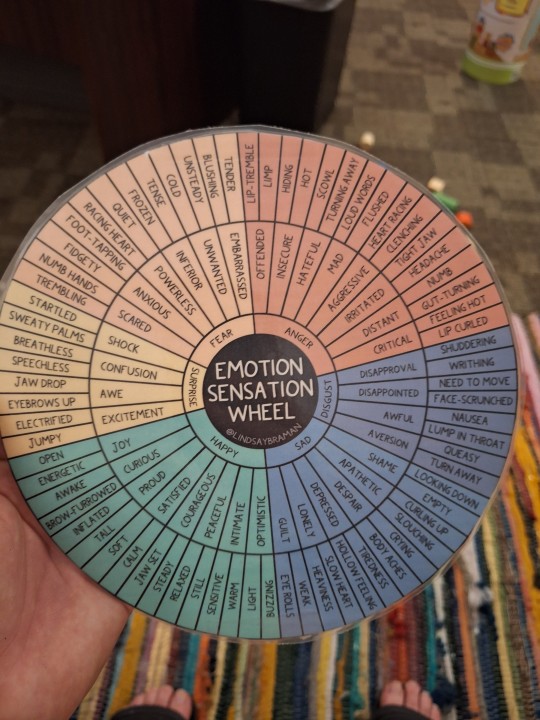
12 notes
·
View notes
Text
youtube
0 notes
Text

This graphic is so useful, I just wish it was easier to read
1 note
·
View note
